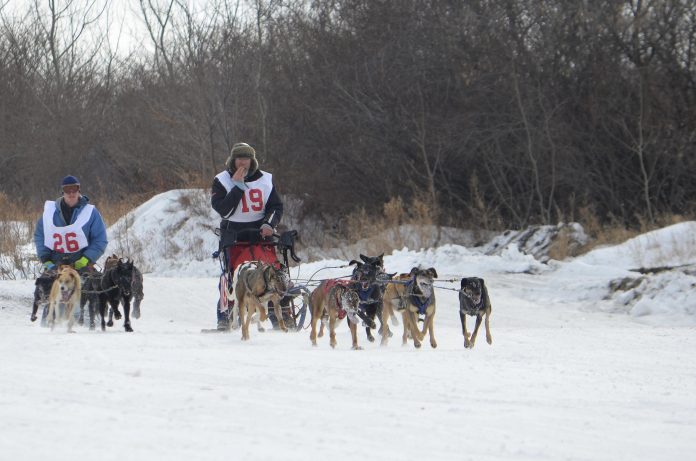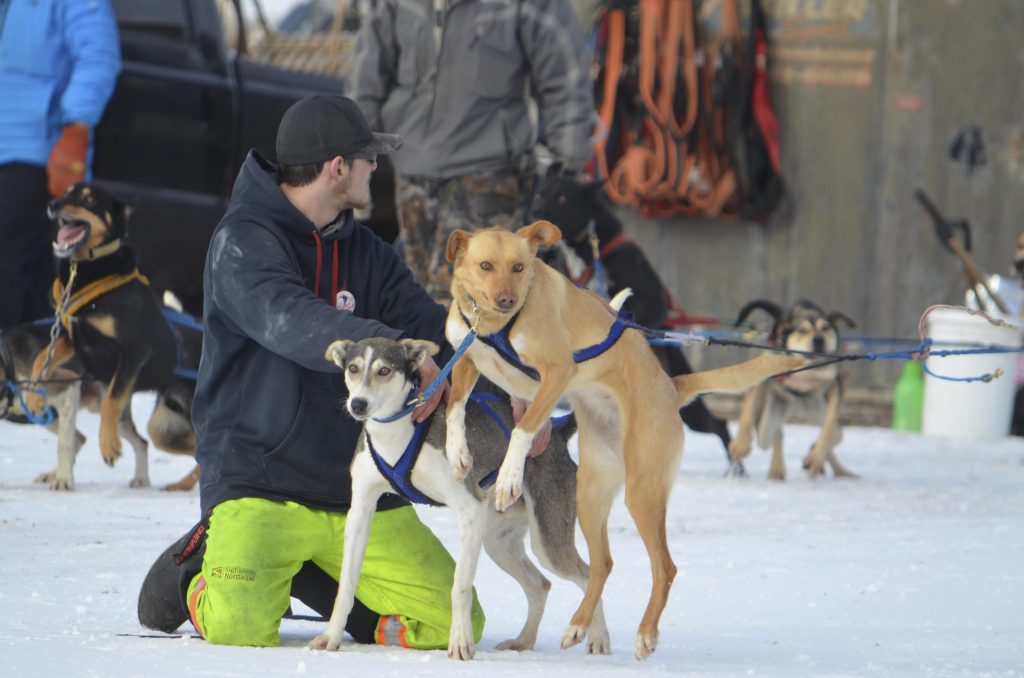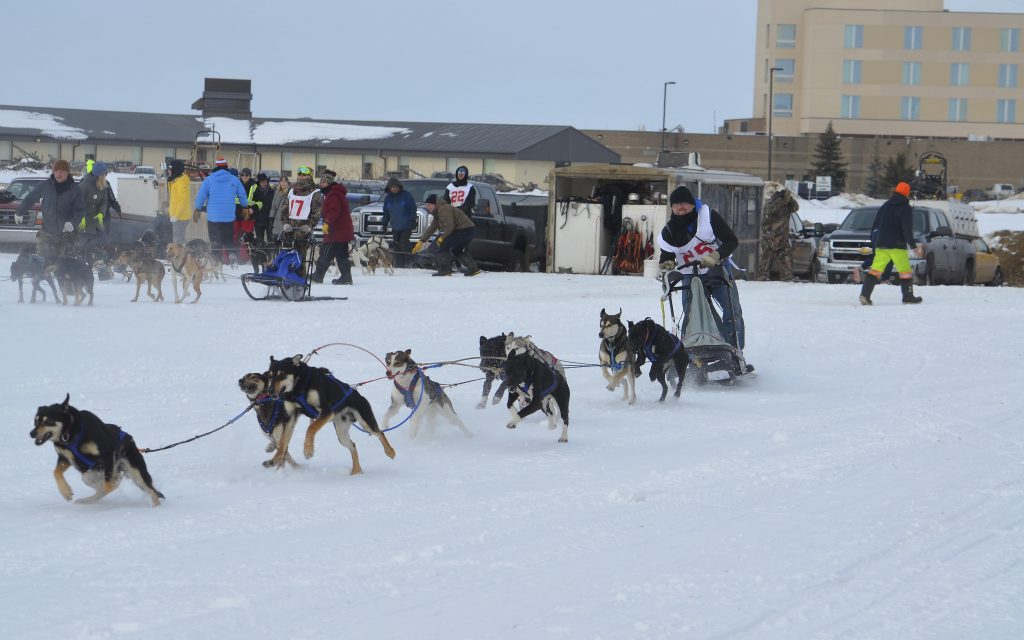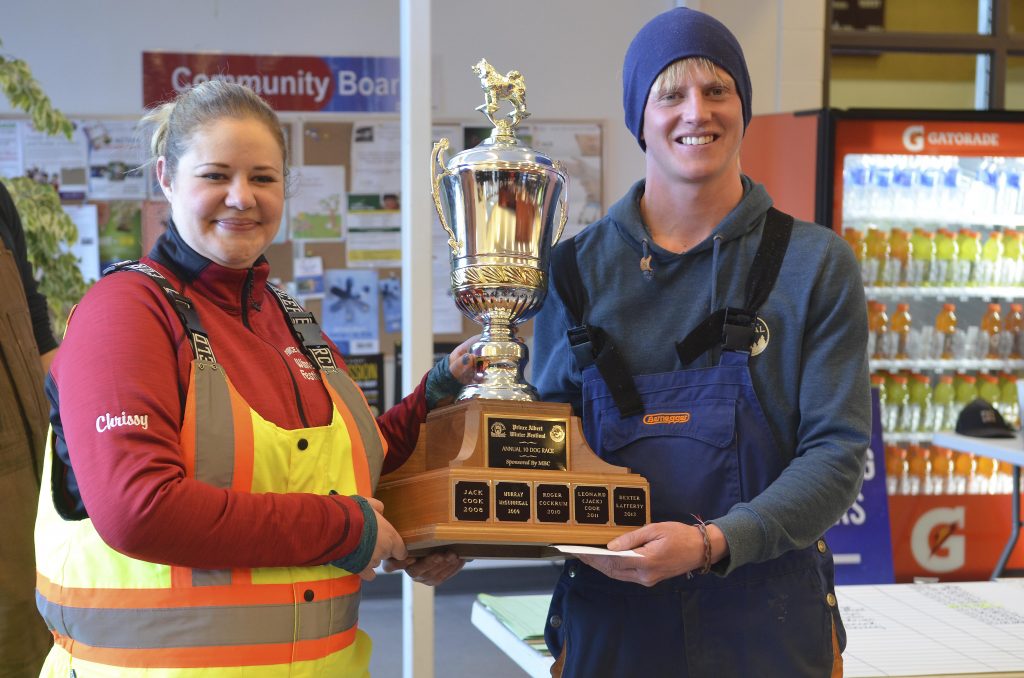
The field behind the Alfred Jenkins Field House was a cacophony of sound Saturday and Sunday during the outdoor portion of the Prince Albert Winter Festival.
Winter Festival board member Chrissy Halliday was commentating the dogsled races. But as time ticked down for each start, her voice, amplified through the sound system, was drowned out by the barking of dozens of dogs, waiting to run.
The canine athletes were ready to go, pulling at their harnesses and jumping up on each other as they tried to get going and start their race.
But they had to wait.

A few hundred yards down the freshly-groomed course, Jess Meredith stood in the back of a pickup, three flags at his disposal; red, yellow and green.
He is a second-generation race starter. His father started the Winter Festival races for 35 years before his death in 2009. Jess took over in 2010 and has done it ever since.
With only seconds to go before the start, he holds up a green flag. The mushers are now on their sleds, their handlers managing the lead dogs, with others poised to release the sleds from the tow ropes attached to the rows of trucks, holding the sleds in place while the dogs try desperately to run.
Just as the barking hits a fever pitch, Meredith’s arm drops, waving the green flag.
The race is on, and the starting area has become deafly silent, with the only sounds the sleds skis on the snow.
The contrast – from anticipation to silence — never gets old for Meredith.
“There’s always so much excitement out there. It’s wonderful to see the enthusiasm of the dogs going the way they go. They never want to stop,” he said.
And then, when the green flag waves?
“Silence.
“Keep your eyes focused on that chute. The first ones to get through are usually the ones who make it back here first. You never know what’s going on out there.”
Meredith got to watch race after race over the weekend, as mushers and their dogs competed in one, three, four, six and ten-dog races.
The ten-dog is the marquis event. Athletes compete in two races over two days. The best time wins.

Meredith’s comment, that you don’t know what’s going to go on out on the course, was certainly true for Carl Knudsen. He started the ten-dog race with a team of eight. He finished with a team of seven.
It didn’t slow him down. Knudsen, of Porcupine Plain, finished with the best overall time over two days to earn the victory, and the trophy.
“I’ve run it a couple times, and I had some bad runs before, but I had a good run this weekend,” he said.
“Starting with eight dogs, I knew I wasn’t going to have the power going up the hills and the soft spots, and I would have to do some pedalling myself. I knew today I would go with seven dogs, and if they all ran well, I knew I could get the win, and that’s what I did today.”
Knudsen said part of what led to his success is experience. He’s been sledding for 14 years. He took a break in the middle to work after going to school for a few years, but now he’s back on the dogsled circuit. He’s also bred a few better dogs, and travelled all over the country. Ideally, Knudsen would like to travel up north for some more races this year, but with the injuries to his dog team, he doesn’t know if he’ll have the personnel he needs.

The winning 10-dog time wasn’t Knudsen’s only contribution to the Winter Festival races this year.
Lance KwasneyBird got into dogsledding thanks to Knudsen’s help. Sunday was only his second ever race, competing in the four-dog race. He won in 12 minutes and 46 seconds.
“I helped (Carl) at a race (in Porcupine Plain) and started helping him at his farm with the dogs. I went to a few races,” KwasneyBird said.
“Last weekend, at my first race, I didn’t do so well. I came second last. This weekend I wanted to do better, and pulled out first place.”
KwasneyBird said the race felt really good. He was able to get ahead right off the start, and maintain one of the top positions to the end. For him, it’s the experience that keeps bringing him back.
“The adrenaline you get from the dogs when you get going (is the best part),” he said.
In the six-dog race, Leesha Sinclair came out as the winner after a two-day time of 31:01.13.
Demi McGunigal won the three-dog race.

